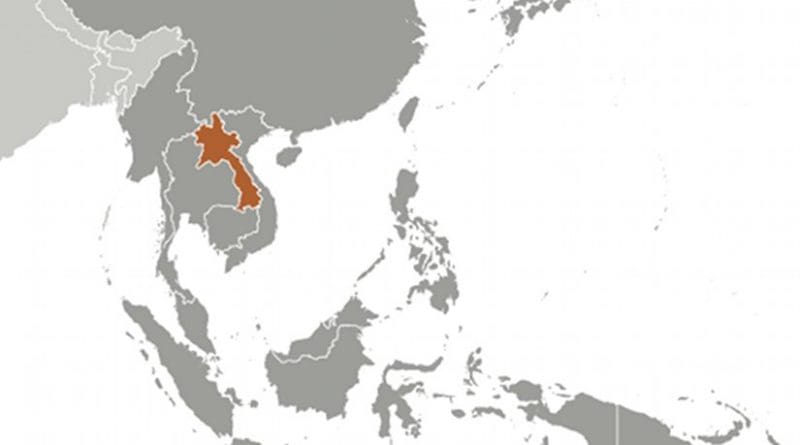Laos: ‘False Claims’ In Dam Report
By RFA
A new report commissioned by the Lao government makes “false claims” regarding the impact of a planned hydroelectric dam in the landlocked country and should not be used as a basis for proceeding with the project, according to a conservation group.
Despite acknowledging uncertainties about how the Xayaburi Dam would affect riparian communities in Laos and other countries along the Mekong River, the report, released Wednesday by Swiss company Pöyry Energy AG, recommends that the dam be built, falsely claiming concerns about the project have been addressed, the U.S.-based International Rivers said in a statement Wednesday.
“The Pöyry report sidesteps science and relies instead on guesswork, making it an unsuitable basis for decision-making on the Xayaburi Dam,” said Ame Trandem, Southeast Asia Program Director for International Rivers.
“Pöyry claims that the project complies with Mekong River Commission (MRC) guidelines, despite listing over 40 major scientific and technical studies that still need to be completed. It would be irresponsible of Laos and other Mekong countries to support the Xayaburi Dam based on the false claims of this report.”
The Lao government hired Pöyry Energy AG in May to undertake a three-month evaluation of the project’s compliance with the MRC’s requirements for Mekong Mainstream Dams after the regional body decided in April to defer any decision on the U.S. $3.8 billion project to the end of 2011.
The MRC, which consists of Laos and neighbors Thailand, Vietnam, and Cambodia, concluded at the time that the potential for damage to rice farming and fishing communities along the river warranted the suspension of work on the dam.
In early September, the Lao government announced that the Pöyry report would be presented to neighboring governments as part of a plan to begin full construction on the dam before the end of the year.
Sulasak Krahan, a public relations officer for the MRC, told RFA in an interview that his organization had received a copy of the report and was in the process of reviewing Pöyry’s findings.
“The MRC has received the report on Xayaburi dam project and our experts are now reviewing it. The review is expected to be completed soon and the MRC will inform the public of our findings.”
While Laos has yet to publicly disclose the report, a leaked copy has recently been widely circulated.
Report shortcomings
International Rivers said it has identified at least 15 “fundamental” MRC requirements with which the Xayaburi Dam still does not comply.
“The Pöyry report avoids mentioning many of these requirements, and instead proposes unproven mitigation measures without having basic data about who, what, when, and how much will be impacted,” International Rivers said.
In particular, the group noted the report’s lack of provisions for an MRC requirement that the dam include safe passage for at least 95 percent of key fish species. Instead, it said, Pöyry promoted technologies that have never been applied on the Mekong River or used successfully in any tropical river.
“Fishery experts from around the world have concluded that no technology exists to effectively mitigate the impacts mainstream dams would have on the world’s largest inland fishery,” International Rivers said.
The river conservation group said it found several other shortcomings in the Pöyry report, including analysis of ecosystems, sediment flows, and dam safety.
Critics of the dam say it would destroy the river’s ecology and disrupt the livelihood of riparian communities that rely on it for their livelihood.
They also fear that proceeding with the Xayaburi dam would give a green light to construction on as many as 10 other hydropower projects planned for the lower Mekong.
Several groups have issued warnings that any dam built in the area may be at risk of collapse because the site is prone to earthquakes.
In the report, Pöyry falsely claims that a regional prior consultation process on the Xayaburi is already complete and that the Lao government can make a unilateral decision on whether to proceed on the dam, International Rivers said.
“Pöyry incorrectly asserts that the Lao government is not required to respond to the concerns of other governments and the MRC about the project’s transboundary impacts before the dam’s construction begins,” it said.
Government push
International Rivers said that the Lao government had been working hard to push the dam project forward—proceeding with construction on access roads and work camps despite the lack of a regional agreement.
“It’s not surprising Laos has commissioned Pöyry as their hired gun given their long history of involvement in controversial projects in the Mekong region and their close ties to the Xayaburi Dam’s main builder, Ch. Karnchang,” Trandem said in the statement.
“Poyry and Ch. Karnchang are currently working together on another hydropower project in Laos, the Nam Ngum 2 Dam. It comes as no surprise that Pöyry would give its business partner a positive review, despite strong evidence to the contrary.”
With plans to build a total of 70 hydropower projects, Laos hopes to become “the battery” of Asia.
International Rivers said that as the first Mekong mainstream dam to undergo the MRC’s prior consultation process, the Xayaburi will set the bar for how decisions are made on all 11 dams proposed for the river.
“Over 40 million people, or two-thirds of the population in the Lower Mekong Basin, are involved in the Mekong’s fisheries at least part-time or seasonally. The future lives of many depend on governments’ willingness to say no to the Xayaburi Dam,” it said.
A decision on the Xayaburi Dam is expected to be made at the upcoming MRC Council meeting, scheduled for Dec. 7-9 in Siem Reap, Cambodia.
Reported by RFA’s Lao service. Translated by Max Avary. Written in English with additional reporting by by Joshua Lipes.

